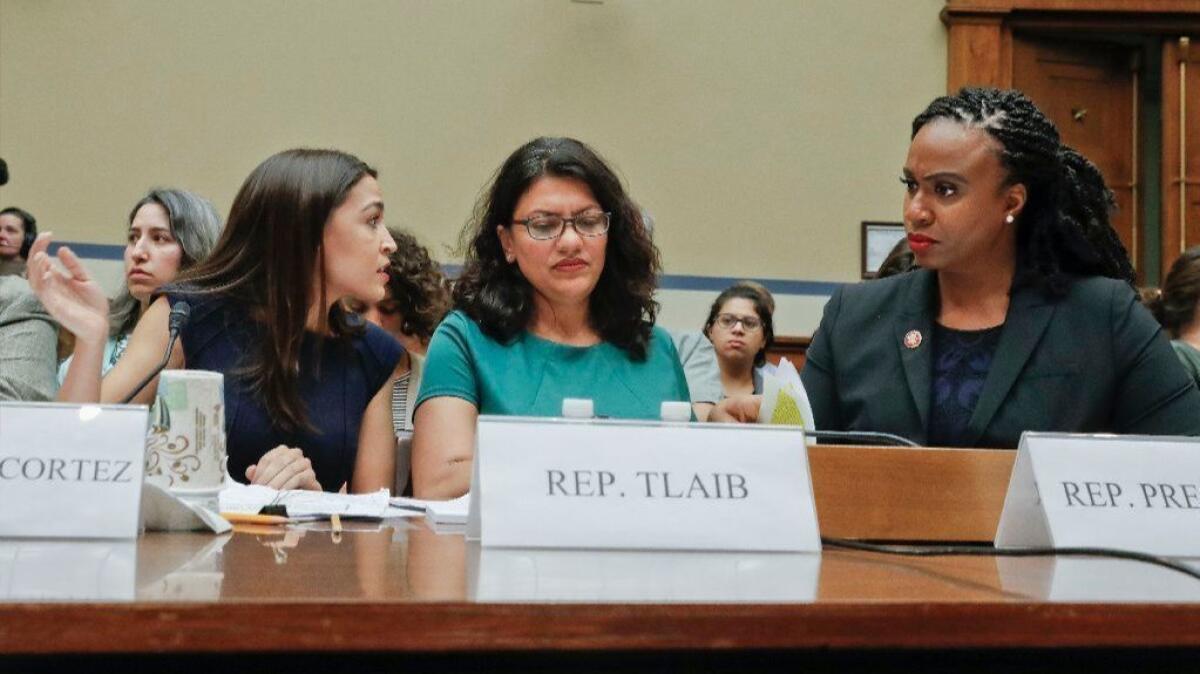As Trump doubles down on racist comments, House to vote on condemning them

President Trump delivered some of the most incendiary comments of his presidency on Monday, signaling that he intends to build his reelection bid as much around divisive racial and cultural issues as on low unemployment and economic growth.
The rhetoric sparked unusual pushback from several Republicans, and led to a dramatic clash in which four first-year House Democrats — all women of color — denounced Trump’s language as “xenophobic,” “bigoted” and unworthy of a sitting president.
Earlier, Trump had vilified the four elected members of Congress as “people who hate our country.”
“They hate it, I think, with a passion,” he told reporters.
The House is planning to condemn Trump’s comments as “racist” in a resolution to be voted upon as soon as Tuesday. The four-page resolution praises immigrants and condemns Trump’s comments, which have “legitimized and increased fear and hatred of new Americans and people of color.”
Trump was asked Monday if he was concerned that white nationalists had found common cause with him after he had urged progressive Democrats to “go back and help fix the totally broken and crime infested places from which they came.”
“It doesn’t concern me because many people agree with me,” Trump said. “And all I’m saying is if they want to leave, they can leave.”
Trump questioned the patriotism of the four lawmakers — all U.S. citizens and three born in the United States — at an event intended to highlight American-made products.
His rhetoric trampled over the economic populism his aides had sought to convey with the visual display of motorcycles and military equipment, providing new evidence that Trump’s “America First” agenda is as much about identity politics as it is about trade.
Trump views his efforts to fan racial and ethnic tensions as a political positive for his reelection campaign, even as others worry about the long-term damage to a country that has long struggled to reconcile its commitment to pluralism with its historical racism.
Overall, Trump’s taunts to the four — Reps. Alexandria Ocasio-Cortez (D-N.Y.), Ayanna Pressley (D-Mass.), Ilhan Omar (D-Minn.) and Rashida Tlaib (D-Mich.) — served to unify Democrats just as they were facing one of their most serious fractures since taking control of the House in the 2018 election.
Pressley was born in Cincinnati, Ocasio-Cortez in New York and Tlaib in Detroit. Omar was born in Somalia and came to the United States in 1997 as a refugee, later becoming a U.S. citizen.
But it also elevated the four progressives in the public eye, potentially causing more problems for Democratic leadership.
Speaker Nancy Pelosi (D-San Francisco) has been at odds with the four over the direction of the House majority, including a recent border spending bill. For weeks, progressives viewed Pelosi as pandering to more politically vulnerable moderates in the caucus.
But the four focused only on Trump Monday in a 20-minute news conference at the Capitol.
“This is the agenda of white nationalists,” said Omar, who accused Trump of tweeting to distract Americans from his policies. “We can continue to enable this president and report on the bile of garbage that comes out of his mouth or hold him accountable for his crimes.”
The president can’t defend his policies, “so what he does is attack us personally and that is what this is all about,” Ocasio-Cortez agreed. “He can’t look a child in the face and look all Americans in the face to justify why this country is throwing [them] in cages,” referring to migrant detention camps on the Southwest border.
“Despite the occupant of the White House’s attempt to marginalize us and silence us, please know we are more than four people,” Pressley said. “We ran on a mandate to represent those … left behind.”
Elected Republican officials were largely silent on Sunday, but several condemned Trump’s language on Monday, collectively forming some of the most significant pushback the president has seen from fellow Republicans.
“I am confident that every Member of Congress is a committed American,” tweeted Rep. Michael R. Turner (R-Ohio). Trump’s tweets “were racist and he should apologize. We must work as a country to rise above hate, not enable it.”
Some of the president’s sometime-critics — including Republicans Rep. Will Hurd of Texas and Sens. Lisa Murkowski of Alaska and Susan Collins of Maine — spoke out.
So did Sen. Mitt Romney of Utah, who called Trump’s comments “destructive, demeaning, and disunifying” in a tweet. He added, “People can disagree over politics and policy, but telling American citizens to go back to where they came from is over the line.”
But unexpected critics arose, too.
Sen. Patrick J. Toomey (R-Pa.) said Trump “was wrong to suggest that four left-wing congresswomen should go back to where they came from. Three of the four were born in America and the citizenship of all four is as valid as mine.”
Some Republicans supported Trump, however, suggesting that his mark on GOP politics would probably continue even after he leaves office.
“There’s no question that the members of Congress that @realDonaldTrump called out have absolutely said anti-American and anti-Semitic things. I’ll pay for their tickets out of this country if they just tell me where they’d rather be,” tweeted Rep. Ralph Abraham (R-La.)
House Democrats stepped up their criticism, announcing the resolution drafted by their colleagues who were born abroad, including Rep. Tom Malinowski (D-N.J.), who was born in communist Poland and moved to central New Jersey when he was 6.
“The president of the United States is supposed to bring this country together. It’s clear this president won’t,” said Sen. Charles E. Schumer of New York, the highest-ranking Democrat in the Senate.
A wide swath of House Democrats condemned the president’s comments as racist and defended their fellow lawmakers as loyal Americans.
“The offensive comments made this morning about my colleagues are totally unacceptable and wrong,” tweeted Rep. Josh Gottheimer (D-N.J.), a leader of the Problem Solvers Caucus, which has squared off against the progressives. “There is no place for it (in Congress or anywhere in our country).”
Trump singled Omar out by name on Monday as he attempted to draw attention to her previous provocative or distasteful comments about Israel and the terrorist attacks of Sept. 11, 2001.
Omar has referred to the 9/11 terrorist attacks as a moment when “some people did something,” language her allies said was taken out of context. She later said that political supporters of Israel are advocating for “allegiance to a foreign country.”
Trump falsely suggested the three other lawmakers had endorsed Omar’s comments.
“When I hear the anti-Semitic language they use, when I hear the hatred they have for Israel and the love they have for enemies like Al Qaeda, then you know what — I will tell you that I do not believe this is good for the Democrat Party,” Trump said.
Omar refused to respond to Trump’s suggestion that she was an Al Qaeda sympathizer.
“I know that every single Muslim who has lived in this country and across the world has heard that comment, so I will not dignify it with an answer, because I know every single Islamophobe, every single person who is hateful, who is driven by an ideology of ‘othering’ as this president is, rejoices in us responding to that and us defending ourselves,” she said at the news conference.
Trump has trafficked in racist and racially charged politics for decades, working to keep African Americans out of his and his father’s apartment buildings in Cincinnati and New York from his earliest days in the real estate business.
In 1989, he ran newspaper ads calling for the death penalty after five black and Latino teenagers were accused of raping a jogger. Last month, he suggested the Central Park Five might still be guilty even if they were exonerated by DNA evidence and another man’s confession years ago, saying, “You have people on both sides of that.”
Trump raised his profile as a political figure on the right during President Obama’s tenure by fanning false conspiracies questioning whether Obama was born in the United States.
And he drew some of the strongest rebukes of his own presidency in August 2017 when he said there were “very fine people on both sides” in violent clashes between white supremacists and counterprotesters in Charlottesville, Va.
James Fields, who drove his car into a crowd and killed a woman during the rally, was sentenced Monday to life in prison plus 419 years on state charges. Fields was previously sentenced to life in prison on federal hate crime charges.
More to Read
Get the L.A. Times Politics newsletter
Deeply reported insights into legislation, politics and policy from Sacramento, Washington and beyond. In your inbox three times per week.
You may occasionally receive promotional content from the Los Angeles Times.








